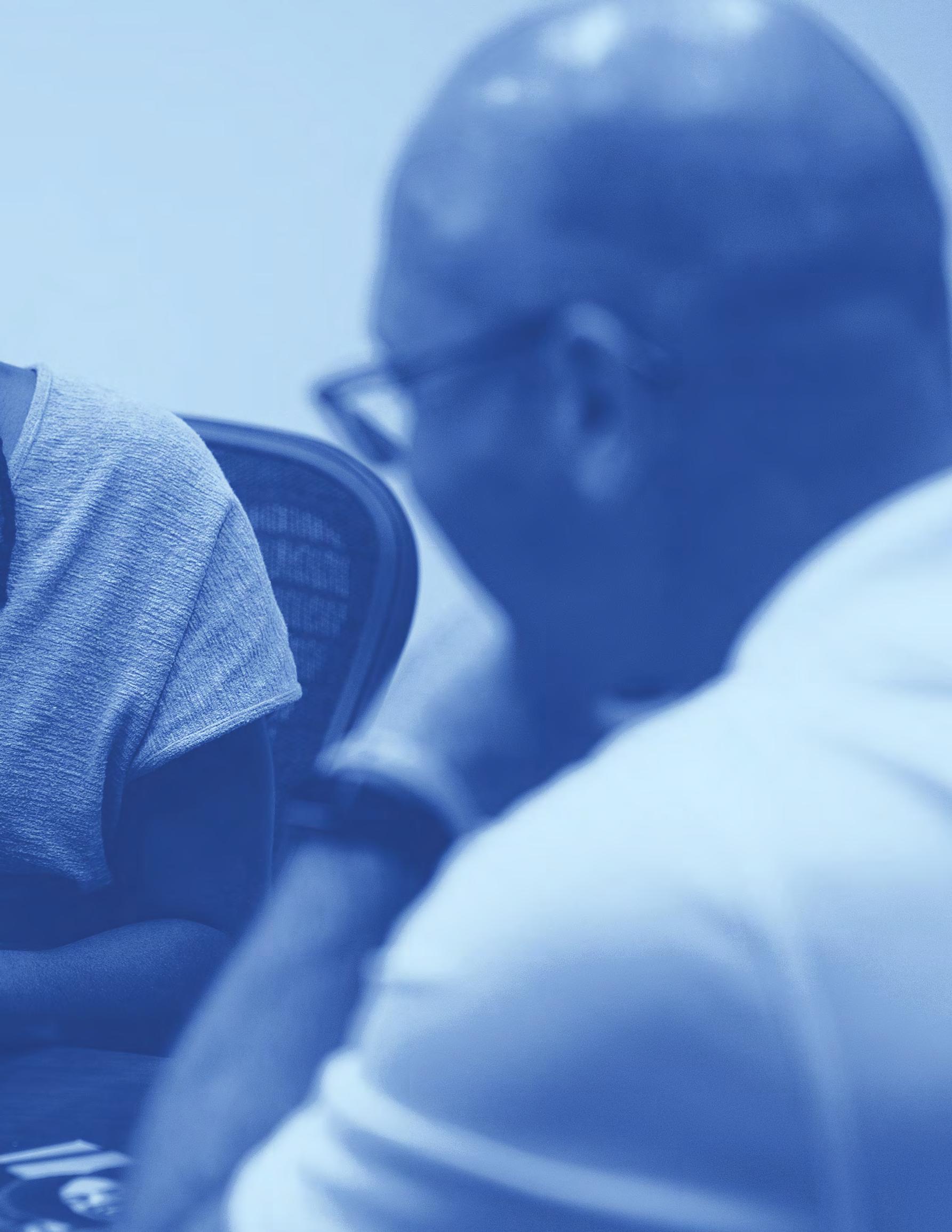




MILPHA BLAMO, EdD VICE PRESIDENT OF TALENT & CULTURE






MILPHA BLAMO, EdD VICE PRESIDENT OF TALENT & CULTURE
Twelve years ago, driven by my desire to help people have a more meaningful experience at work, I made a big career shift and transitioned into Human Resources. Since joining the Minneapolis Foundation in 2019, I have been inspired and deeply moved by our unwavering dedication to equity and to creating a more inclusive workplace.
As one of the nation’s oldest community foundations, the Minneapolis Foundation continues to lead the way in philanthropic operations and impact. As our mission evolves, so do our internal practices—reflecting internally the collective impact we have externally.
During my time, we have continued to redefine the function of our Human Resources department and realize a workplace that cultivates care, collaboration, and openness. Hence the title, “Talent and Culture.” This better reflects our commitment to creating a culture of respect and excellence.
This also represents the culmination of our time spent listening to the community, learning from others in the field, and gathering input from our staff to improve our services and internal operations. This document speaks to our evolution, highlights the remarkable work we have accomplished internally, and outlines our aspirations for the future.

The Minneapolis Foundation cultivates generosity in Minnesota and beyond by partnering with communities–drawing together a diverse collective of people to share their time, funds, opinions, knowledge, and experience.
On any given day, we are taking action on the greatest civic, social, and economic need through grantmaking, services to donors and nonprofits, and research and advocacy. By making deeper connections and utilizing more voices and resources, we’re widening our circle of what’s possible as a community foundation.
We sustain our legacy as one of the most effective foundations by constantly evaluating and innovating how we best serve our community and world.
Together, we drive collective action to realize strong, vibrant communities.
We believe that those closest to issues are best positioned to understand and address them. Thus, we partner with others to sow and nurture the seeds of strong, vibrant communities by:
• Promoting civic participation and leadership
• Fostering belonging, connection, and inclusion
• Increasing access to opportunities that advance upward mobility
• Seeing and dismantling barriers that hold inequities in place

Our team of philanthropic advisors empowers individuals and their families to make a positive impact in their communities. We achieve this by assisting them in establishing donor-advised funds and giving circles, and providing resources to connect them with opportunities and organizations both within Minnesota and beyond.
For nonprofits, we offer a range of grant opportunities throughout the year. We also believe in the power of meaningful partnerships, and as such, we collaborate with civic leaders, businesses, and other influential changemakers.
Side-by-side, we take action on urgent needs such as climate justice, racial equity, economic vitality, education, the arts, and other societal concerns as they arise—cultivating change together.
The Minneapolis Foundation strives to cultivate an organizational culture that aligns with our core values, and our talent acquisition and management strategies reflect that commitment. This guide offers comprehensive insights into our approach to Talent and Culture, supporting our goal of fostering a culture of collaboration, excellence, and respect while ensuring accountability among all members of our organization.


At the Minneapolis Foundation, diversity, equity, and inclusion are embedded in our culture and the way we pursue our work.

Like all our work, our Talent and Culture plan is driven by passion and guided by these core values:
We work to change ourselves through listening, learning, understanding, and taking responsive action.

We reflect internally the community we hope to see externally.
We see and remove personal and systemic barriers that hold inequities in place.
The closer we get, the more we understand, empathize, and transform; we can always get closer.

Places and systems that value and work for everyone foster the diverse participation needed to solve complex problems.
Recognizing the challenges of today does not eliminate our ability to see—and create—a better future.

When our staff is leaning into these core values, they are:
• Exercising independent judgment in pursuing individual and organizational goals; recognizing situations in which consultation is required.
• Analyzing challenging situations and taking reasonable risks to achieve the desirewvd ends; solving problems.
• Recognizing individual similarities and differences as opportunities to build appreciation, productivity, and creativity.
• Acknowledging the impact of perspectives influenced by personal experience and background.
• Demonstrating a willingness to understand others’ perspectives in order to build constructive and effective relationships.
• Understanding that every person is, in the context of our work, a valued partner.
• Considering and executing all actions and decisions according to the highest standards of ethical behavior, including honesty, fairness, respect, and compassion.
• Applying new skills thoughtfully to increase efficiency and improve individual and team performance.
• Continuously adapting to changes in environment and organizational requirements.
• Fostering respectful, participative relationships among team members to ensure effective team dynamics.
• Working to uniquely manage, support, and motivate each team member.
• Assessing and recognizing the unique contributions, abilities, and talents of team members.


The Minneapolis Foundation strives to employ a team—especially leaders—who are culturally competent and reflect the makeup of the communities we serve.




At the Minneapolis Foundation, our people make our mission possible. As we continue to grow our community of neighbors, partners, board members, and volunteers, it is crucial that the staff we bring on share our values and are vested in our mission to cultivate generosity. Our efforts to achieve this goal begin with the recruitment process.
The Minneapolis Foundation strives to employ a team—especially leaders—who are culturally competent and reflect the makeup of the communities we serve. To that end, equity is deeply embedded in every step of our talent acquisition process. To ensure equitable access to employment opportunities, we promote position openings at various sites with diverse audiences and subscribers—increasing the likelihood of a diverse pool of applicants.
Given that job postings are often the first interaction that a prospective employee has with the foundation, we view them as an opportunity to communicate our culture of transparency. In addition to the information required by law, our job postings include pay ranges and our hybrid work schedule. This transparency establishes trust and allows prospective employees to make an informed decision to apply.
During our hiring process, we strive to remove barriers that hold inequities in place. One way we do this is by providing candidates with resources designed to equip them for success in interviews. For example, core values alignment is the main focus of our first-round interview and weighs heavily in hiring decisions, so when we invite candidates to interview, we provide them with a copy of our Strategic Framework so they can ground themselves in our work and deepen their understanding of our culture.

It is important that hiring decisions are made collaboratively and that we have diverse perspectives around the decision-making table, so we invite staff from across the organization to serve on our hiring panels. Our hiring process always includes the Vice President of Talent and Culture, the hiring manager, and the department head. These strategies ensure that new employees are aligned with our organization’s values.



We take a holistic approach to creating a work environment and systems that support all of our employees. Overall, we see our team as people first, employees second.

Our commitment to supporting our employees begins with their first interactions with us as applicants and continues as they are hired onto our team and grow into their roles.
During a new employee’s first 30 days with us, they go through our Talent and Culture orientation, which introduces them to our history, Strategic Framework, mission, core values, team culture, and systems. The main objective of this orientation is to help new employees become familiar with our core values and begin to identify ways to embed those values in their daily interactions with the team and our greater community of neighbors and partners.

During this time, operational staff and leaders set aside time to meet with new team members. To support a culture of transparency, we have an “open door policy” and encourage direct engagement between all levels of our staff. This policy centers on psychological safety1 and aims to make leaders accessible and available to engage with our whole team, promoting self-efficacy and advocacy among staff members.



In the first three months of employment, new team members also go through onboarding specific to their department. This training is designed by the hiring manager and is individually catered to meet the learning needs of the new team member.
It is equally important to support new employees in building relationships, so we prioritize ongoing staff engagement events and activities that create opportunities for them to build connections with the rest of the organization. The sense of belonging2 new employees build through these welcoming efforts is key to their engagement, development, and retention.
We take a holistic approach to creating a work environment and systems that support all of our employees.
One way that we do this is by operating a hybrid workplace in which our employees work remotely three days a week. We made the decision to adopt a hybrid environment after extensive research, as well as an internal survey of our staff members to gather their input.
We have found that this approach offers our employees both the flexibility of remote work and the ability to maintain the social connection that accompanies in-office environments3
To ensure that everyone has a sufficient hybrid work environment, we give new employees a stipend for their home office. Employees can also purchase desk supplies needed for their in-person workstations so that whether they are working remotely or in-person, their environment is conducive to their best work.
In a variety of ways, we strive to limit barriers to coming into the office and support work-life balance. For example, we assist with fees related to transportation and parking, offer snacks/meals throughout the work day, and implement half-day Fridays during the summer months.
Overall, we see our team as people first, employees second.
We prioritize our staff’s well-being by offering competitive compensation and benefits programs designed to support them and their families. Among U.S. adults, high financial worries are strongly linked to higher psychological distress 4 Thus, by ensuring our employees can meet their financial needs, we are investing in their overall mental health and their ability to excel in their roles while maintaining a healthy work-life balance.
We believe that equitable compensation is an important aspect of the work environment: It communicates value, helps maintain job satisfaction, and promotes retention5. We strive to maintain a robust total compensation program, within our financial capability, that is comparable to what is offered by similar organizations operating within and outside of our geographical area.
Our strategies for maintaining equitable and competitive compensation include conducting a compensation study every two years. We consider base pay competitive when it is within 15% of the market rate. Additionally, as team members are promoted or given additional work, we review their salaries to ensure internal parity and equity.

Our benefits offering is designed to:
• Provide individual choice and flexibility, recognizing the diverse needs of our staff.
• Be sustainable and flexible, as necessary, to meet the needs of the staff.
• Be inclusive by offering consistent benefits to employees working twenty hours or more per week.
• Share the cost of health benefit premiums for employees and their dependents.
• Be managed in a fiscally responsible manner, compliant with state and federal regulations.
In addition to our highly competitive and generous medical benefits package, we also offer both personal and sick time off which begins to accrue as soon as they are hired. We also offer a generous 401(k), with employer contribution after 30 days of employment. Because the well-being of our employees is a top priority, we also provide a generous Employee Assistance Program that equips employees with the resources to navigate unexpected challenges.

To support our employees in participating in our mission by making an impact on the causes they’re passionate about, we offer each new staff member a non-fee-based Donor Advised Fund.



Equity means giving each individual what they need to have their best chance at success.

Equity means giving each individual what they need to have their best chance at success. At the Minneapolis Foundation, we see our staff as one of our greatest assets, and we are committed to being generous and flexible when it comes to their unique growth and development needs.
In addition, we are committed to nurturing internal talent and continue to seek and create opportunities for promotions and leadership of cross functional teams.
To give our employees equitable access to professional development, we provide financial support for their individual growth. This has included leadership development programs, fellowships, and professional association memberships. We also take measures to ensure that our leaders are equipped with the tools and skills to effectively manage and coach their teams. As part of our commitment to this goal, we have recently introduced a “Manager to Coach” training series.
To promote cross-departmental collaboration, and to deepen our learning of topics and issues related to Diversity, Equity, Inclusion and Belonging, our staff-led workgroup hosts a monthly learning session. The sessions are facilitated by both external practitioners in the field and members of our team. Participation and engagement at these meetings remain consistently high. We also regularly send cross-functional groups to trainings and conferences.
In working to improve our cross-departmental collaboration, we intentionally promote collective learning and send cross-functional groups to trainings and conferences for collective learning and collaboration.




To better align our internal culture with our Strategic Framework, in 2023 the Minneapolis Foundation adopted a values-based performance review process.
In contrast to task-based performance reviews, which are based on a competitive approach to evaluation with harmful effects on work culture, this values-based model6 allows employees to reflect, annually, on how their roles tie into our core values. The focus is not solely on the tasks completed by our employees, but on how well they exhibit the competencies tied to our values during their interactions with our internal and external community.
Our supervisory roles have also been redefined to better align with a values-based review process. Supervisors function more as mentors and coaches7 establishing consistent check-ins with their employees throughout the year.
This process enables ongoing feedback that can be utilized in real time. As a result, the annual review serves as a time for introspection, highlighting achievements, identifying areas for development, and providing supervisors with valuable feedback on the impact of their support.


Collaboration is a fundamental element of our Strategic Framework, serving as a cornerstone of our mission to achieve collective impact.
For
us to achieve our mission to cultivate generosity, it is vital that we sustain our talented and thriving community.
A
crucial aspect of sustainability is belonging.
As a hybrid organization, building relationships requires consistent intention to make the most of our time in person. So we prioritize events that can bring us together and create spaces that encourage relationship-building. These events and activities are carefully planned and curated by our Vice President of Talent and Culture and Director of Engagement and Events.
Each year, we host two to three large-scale and a few intimate gatherings near the office. Our staff look forward to these events, and we build them into our regular workday making time less of a barrier to participation. As a result, over 85% of our team attends each event.
Although an in-person office cannot replace a personalized home office, there are aspects of being in-person that cannot be fully replicated at home. The most obvious is connecting with coworkers throughout the work day and building a sense of belonging—cultivated by a shared purpose and sense of interconnectedness8.
To promote these connections, we facilitate the everyday organic interactions that create a sense of belonging. We promote check-ins by giving staff across the organization the resources and opportunities they need to connect. We also cater lunch during the week. These frequent, ordinary moments are the ones that foster the natural human connections that build a community.
A lso tethered to retention is competitive pay. It is no secret that fair compensation is crucial to employee satisfaction and engagement. Every two years, we conduct a compensation study. This strategy evaluates our pay structures for parity and equity, strengthening our ability to retain our staff and attract new talent.


Collaboration is a fundamental element of our Strategic Framework, serving as a cornerstone of our mission to achieve collective impact. Through our internal practices, we value and harness the talents, perspectives, and expertise of every individual on our team. This approach starts with the CEO, who actively partners with team members on various projects to foster an environment that develops psychological safety 9 and minimizes silos and barriers to decision-making.

By breaking down traditional hierarchical structures and encouraging open communication, we create an environment where ideas flow freely and creative problem-solving is possible. Collective action strengthens our internal community and cultivates a robust team culture that empowers individuals who are more proximate to the work, encourages open dialogue, and fosters innovation.


R.T. RYBAK PRESIDENT AND CEO

When our Foundation adopted a new Strategic Framework in 2020, one of the goals seemed simple: “Internal Mirrors External.” However, transforming these words into reality proved challenging. We needed a new approach.
Our new course called for a climate that values introspection and disruptive thinking. To create this environment, we relied on another core value “Change is personal,” which required us to do the personal work to enable community change.
In order to dismantle the barriers that hold inequities in place within our communities, we had to start by dismantling them in our own organization. If our external goal is to engage every community member as an asset, then we must also engage every employee as an asset.
This understanding led us to seek out a leader of Talent and Culture, and we hired Milpha Blamo, who is uniquely qualified to lead this work. The result was a Talent and Culture plan that has propelled our team forward over the past four years, while also revealing how much further we have to go.
Looking ahead, we have ambitious plans to achieve our vision for Talent and Culture, which include further embedding diversity, equity, and inclusion into the way we sustain our team and pursue our work.
We don’t present this as a roadmap developed by a group that believes we have all the answers. Rather, we aim to add to a growing body of work that shows “Internal Mirrors External” is not only possible but essential for the organizations and the world we are working to realize.

1. Best, S., & Broer, J. (Hosts). (2021, January 10). Dr. Amy Edmonson-The Fearless Organization [Audio podcast episode]. In The Bosshole Chronicles. https://open.spotify.com/episode/3V7o9ate2b86KPWBMIasUV?si=jut9p9UeQOq-uGWyDj1UcA
2. Achievers Workforce Institute (2021) Belonging at Work 2021 Culture Report. Achievers Solutions Inc. https://www.achievers.com/ wp-content/uploads/2021/09/Achievers-Workforce-Institute_2021-Culture-Report_Belonging-at-Work.pdf
3. Choudhury, P., Khanna, T., Makridis, C., & Schirmann, K. (2022). Is Hybrid Work the Best of Both Worlds? Evidence from a Field Experiment. Harvard Business School Technology & Operations Mgt. Unit. Working Paper No. 22-063 http://dx.doi.org/10.2139/ ssrn.4068741
4. Ryu, S., & Fan, L. (2022). The Relationship Between Financial Worries and Psychological Distress Among U.S. Adults. Journal of Family and Economic Issues, 44(1), 16-33. https://doi.org/10.1007/s10834-022-09820-9
5. Reddy, V. S. (2020). Impact of Compensation on Employee Performance. IOSR Journal of Humanities And Social Science, 25(9), 17-22. https://doi.org/10.9790/0837-2509011722
6. Stahl, G. K., Björkman, I., Farndale, E., Morris, S. S., Paauwe, J., Stiles, P., Trevor, J., & Wright, P. (2012, Winter). Six Principles of Effective Global Talent Management. Massachusetts Institute of Technology Sloan Management Review, 53(2), 25-32. https://sloanreview.mit.edu/article/six-principles-of-effective-global-talent-management/
7. Ibarra, H., & Scoular, A. (2019, November 1). The Leader as Coach. Harvard Business Review, (168). https://hbr.org/2019/11/the-leader-as-coach
8. Verlinden, N. (n.d.). Diversity, Equity, Inclusion and Belonging (DEIB): A 2023 Overview. https://www.aihr.com/blog/diversityequity-inclusion-belonging-deib/
9. Gube, M., & Hennelly, D. S. (2022, August 25). Resilient Organizations Make Psychological Safety a Strategic Priority. Harvard Business Review. https://hbr.org/2022/08/resilient-organizations-make-psychological-safety-a-strategic-priority?registration=success


